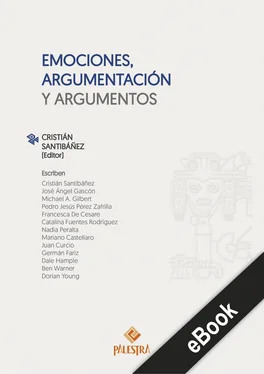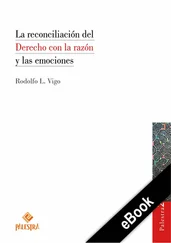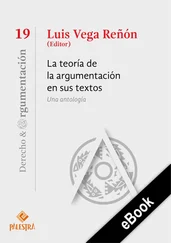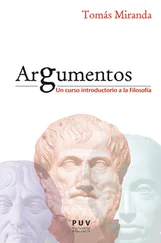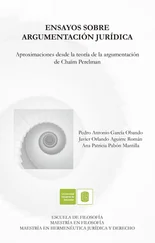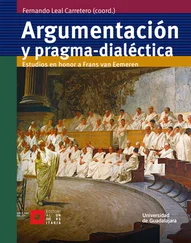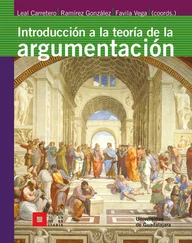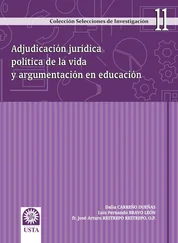Eemeren, F. van & Grootendorst, R. (2004). A systematic Theory of Argumentation. The pragma-dialectical approach. Cambridge University Press.
Eemeren, van F. et al. (2014). Handbook of Argumentation Theory. Springer.
Evans, J. (2010). Thinking Twice. Two Minds in One Brain. Oxford University Press.
García Lorca, F. (2007). Pez, astro y gafas. Menoscuarto Ediciones.
Gendron, M. & Barrett, L. F. (2019). A Role for Emotional Granularity in Judging. Oñati Socio-Legal Series, 9(5), 557-576.
Gilbert, M. (1997). Coalescent Argumentation. Lawrence Erlbaum Associates.
Gilbert, M. (2001). Emotional Messages. Argumentation, 15(3), 239-249.
Gilbert, M. (2004). Emotion, Argumentation and Informal Logic. Informal Logic 24(3), 245-264.
Gilbert, M. (2005). Let’s talk. Emotion and the pragma-dialectical model. En F. van Eemeren & P. Houtlosser, Argumentation in Practice (págs. 43-53). John Benjamins Publishing Company.
Guiraud, N., Longin, D., Lorini, E., Pesty, S. y Rivière, J. (2011). The face of emotions: A logical formalization of expressive speech acts. En K. Tumer, P. Yolum, L. Sonenberg & P. Stone (eds.), Proceedings of the 10th International Conference on Autonomous Agents and Multiagent Systems, Taipei (págs. 1031-1038). International Foundation for Autonomous Agents and Multiagent Systems.
Hamblin, C. L. (1970). Fallacies. Methuen & Co LTD.
Hamblin, C. L. (2017). Linguistics and The Parts of the Mind. Cambridge Scholars Publishing.
Hample, D. (2005). Arguing. Exchanging Reasons Face to Face. Lawrence Erlbaum Associates.
Herman, T & Serafis, D. (2019). Emotions, Argumentation and Argumentativity. Insights from an Analysis of Newspapers Headlines in the Context of the Greek Crisis. Informal Logic, 39(4), 373-400.
James, W. (1884). What is an emotion? Mind, 9(34), 188-205.
James. W. [1890] (2007). The Principles of Psychology. Vol 1. Dover.
Kirsch, J. (2020). Interpreting our emotions. Ratio. An International Journal of Analytical Philosophy, 33(1), 68-78.
Krabbe, E. (1999). Profiles of Dialogue. En J. Gerbrandy, M. Marx, M. de Rijke y Y. Venema (eds.), JFAK: Essays Dedicated to Johan van Benthem on the occasion of his 50th Birthday (págs. 25-36). Amsterdam University Press/Vossius Press.
Krabbe, E. (2002). Profiles of dialogue as a dialectical tool. En F. van Eemeren (Ed.), Advances in Pragma-dialectics (págs. 153-168). Sic Sat.
Macagno. F. y Walton, D. (2014). Emotive Language in Argumentation. Cambridge University Press.
Micheli. R. (2010). Emotions as Objects of Argumentative Constructions. Argumentation, 24(1), 1-17.
Muller, N. (2017). Secundarización de las emociones y aprendizaje en las actividades ‘interculturales’ en clase. En C. Moro & N. Muller (dir.), Semiótica, cultura y desarrollo psicológico (págs. 271-292). Antonio Machado Libros.
Norrick, N. (1978). Expressive illocutionary acts. Journal of Pragmatics, 2(3), 277-291.
Perelman, Ch. y Olbrechts-Tyteca, L. (2000). The New Rhetoric. A Treatise on Argumentation. University of Notre Dame Press.
Plantin, Ch. (2004). On the inseparability of emotion and reason in argumentation. En E. Weigand (ed.), Emotions in Dialogic Interactions (págs. 265-276). John Benjamins.
Plantin, Ch. (2014). Las buenas razones de las emociones. UNM Editora.
Plantin, Ch. (2019). Tense Arguments: Questions, Exclamations, Emotions. Informal Logic, 39(4), 347-371.
Pollaroli, Ch., Greco, S., Oswald, S., Miecznikowski-Fuenfschilling, J. y Rocci, A. (2019). Introduction to the Special Issue. Preface. Informal Logic, 39(4), 287-300.
Quintilian. (2001). The Orator’s Education. Books 11-12. Edited and Translated by Donald Russell. Harvard University Press.
Ronan, P. (2015). Categorizing expressive speech acts in the pragmatically annotated SPICE Ireland corpus. ICAME Journal, 39(1), 25-45.
Searle, J. (1975). A Taxonomy of Illocutionary Acts. En K. Gunderson (Ed.), Language, Mind, and Knowledge (págs. 344-369). University of Minnesota Press.
Stanford Encyclopedia of Philosophy (25 de septiembre de 2018). Emotion. Consultado el 9 de septiembre de 2020. https://plato.stanford.edu/entries/emotion/
Thagard, P. (2000). Coherence in Thought and Action. MIT Press.
Tindale, C. (1999). Acts of Arguing. A Rhetorical Model of Argument. State University of New York Press.
Tindale, C. (2015). The Philosophy of Argument and Audience Reception. Cambridge University Press.
Vanderveken, D. (1990). Principles of language use. Cambridge University Press.
Vega, L. y Olmos, P. (eds.) (2011). Compendio de Lógica, Argumentación y Retórica. Editorial Trotta.
Veresov, N. (2017). Emociones, perezhivanie y desarrollo cultural: el proyecto inacabado de Lev Vygotski. En C. Moro & N. Muller (dir.), Semiótica, cultura y desarrollo psicológico (págs. 221-250). Antonio Machado Libros.
Walton, D. (1992). The Place of Emotion in Argument. Pennsylvania State University Press.
Walton, D. (1997). Appeal to Pity. Argumentum ad Misericordiam. State University of New York Press.
Walton, D. y Krabbe, E. (1995). Commitment in Dialogue. Basic Concepts of Interpersonal Reasoning. State University of New York Press.
Wierzbicka, A. (2002). Australian cultural scripts – bloody revisited. Journal of Pragmatics, 34(9), 1167-1209.
1El carácter debatible queda muy bien expresado en la discusión del término en la enciclopedia Stanford, y en la reflexión que desarrolla Barrett sistemáticamente (como botón de muestra, ver 2018, p. 148-149).
2Un muy buen resumen del rol de la emoción en la teoría de la argumentación ofrece Micheli (2010). Este autor, no obstante, asume en gran parte la posición de Plantin, que en este trabajo se comenta. Es interesante notar, sin embargo, que este autor se esfuerza por defender la idea de que las emociones son objetos de argumentación, vale decir, que los hablantes cuando enfrentan una situación polémica, o participan de ella, buscan legitimar que una posición emocional sobre el asunto es beneficiosa (señalando las consecuencias que de ello deriva, positivas o negativas). El autor denomina su aproximación como una alternativa a lo existente en la teoría de la argumentación. En este trabajo no se acuerda con esta pretensión
3La edición en español que consulto de la Retórica, traduce como sentimiento la noción griega de emoción. La edición LOAB (2000) en inglés conserva la palabra emotion en la traducción de este pasaje: “The emotions are all those affections which cause men to change their opinión…” (Aristotle, 2000, p. 173).
4En este trabajo obviamente no hay espacio para referirnos a las distintas tradiciones y autores en retórica. En la versión del Orador ideal de Cicerón que consulto (Cicero, 2001), las emociones también son tratadas bajo la noción de pathos, y Cicerón, como por ejemplo en el siguiente pasaje, las analiza y comenta en clave de sugerencias pero con desdén en relación con la capacidad de instruir, y con ello convencer, al oyente: “Also, as I have often said already, we bring people over to our point of view in three ways, either by instructing them or by winning their goodwill or by stirring their emotions. Well, one of these methods we should openly display, and we must appear to aim at nothing but giving instruction, while the other two must, just like blood in the body, flow throughout the whole of the speech” (Cicero, 2001, p. 208). No obstante, la obra de Cicerón Disputas Tusculanas, Libros 3 y 4, han sido recibidas como su reflexión más sistemática sobre las emociones.
5No consideraré el libro de Walton en coautoría con Macagno (2014), titulado Emotive Language in Argumentation, por la poca atención que tuvo el libro y la reseña drástica que recibió. Ver, por ejemplo: https://ndpr.nd.edu/news/emotive-language-in-argumentation/. En este sentido es suficiente referirse a las aportaciones previas de Walton.
Читать дальше
